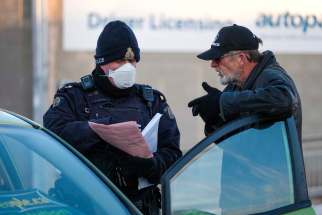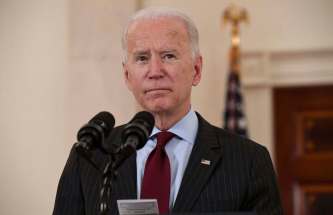Inn-somnia Deserted lobbies, empty restaurants and vacant rooms have led to a year's worth of sleepless nights for management, staff in local hotels
Read this article for free:
or
Already have an account? Log in here »
To continue reading, please subscribe:
Monthly Digital Subscription
$0 for the first 4 weeks*
- Enjoy unlimited reading on winnipegfreepress.com
- Read the E-Edition, our digital replica newspaper
- Access News Break, our award-winning app
- Play interactive puzzles
*No charge for 4 weeks then price increases to the regular rate of $19.00 plus GST every four weeks. Offer available to new and qualified returning subscribers only. Cancel any time.
Monthly Digital Subscription
$4.75/week*
- Enjoy unlimited reading on winnipegfreepress.com
- Read the E-Edition, our digital replica newspaper
- Access News Break, our award-winning app
- Play interactive puzzles
*Billed as $19 plus GST every four weeks. Cancel any time.
To continue reading, please subscribe:
Add Free Press access to your Brandon Sun subscription for only an additional
$1 for the first 4 weeks*
*Your next subscription payment will increase by $1.00 and you will be charged $16.99 plus GST for four weeks. After four weeks, your payment will increase to $23.99 plus GST every four weeks.
Read unlimited articles for free today:
or
Already have an account? Log in here »
Hey there, time traveller!
This article was published 26/02/2021 (1745 days ago), so information in it may no longer be current.
The best word to describe the lobby of the downtown Delta Hotel was empty. The next-best word was cavernous. The third-best word was sad.
I felt the need to scribble those words down on Sunday afternoon when I walked in, with announcements blaring to remind me to stay six feet apart from the other guests, of which I could see none. The chairs in the hotel restaurant were flipped up onto tables. Hand sanitizer was plentiful. Plexiglass enwrapped the front desk like an old-timey ticket booth.
It felt like the hotel was sleeping, and I was rudely tip-toeing in past midnight.

I wondered how I’d have reacted had I found a hotel lobby looking like this in 2018, how any of this would have felt before: confusing, sinister, foreign. Now, it all felt eerily expected: the sanitizer and the floor decals and the chairs spread equidistant from one another. Natural, but still sad.
I came to the hotel for a single night’s stay, to ruminate on the experience for this story about the local hotel industry, which like most other hospitality sectors has been treated anything but hospitably in the past 12 months. The Delta, the city’s largest hotel at 393 rooms, was therefore the one with the most space to fill, and like each of the 109 hotels in Winnipeg, it has had to contend with an unrelenting foe.
“I think a lot about 2019,” hotel general manager Jeff Kennedy says. It was by all accounts the Delta’s most successful year from a revenue perspective. About 100 conferences of doctors and agriculture professionals and Jehovah’s Witnesses and more, booked several months or years in advance, kept the hotel abuzz and its beds slept in. Trade shows, too.
The conference calendar is cyclical, and 2019 was a boom: the city felt strong. The Blue Bombers charged toward their first Grey Cup in 29 years. The RBC Convention Centre, next door to the Delta, had a typically bullish year. Everything was coming together, and the city’s hotels, especially the ones downtown, were benefiting from the traffic.
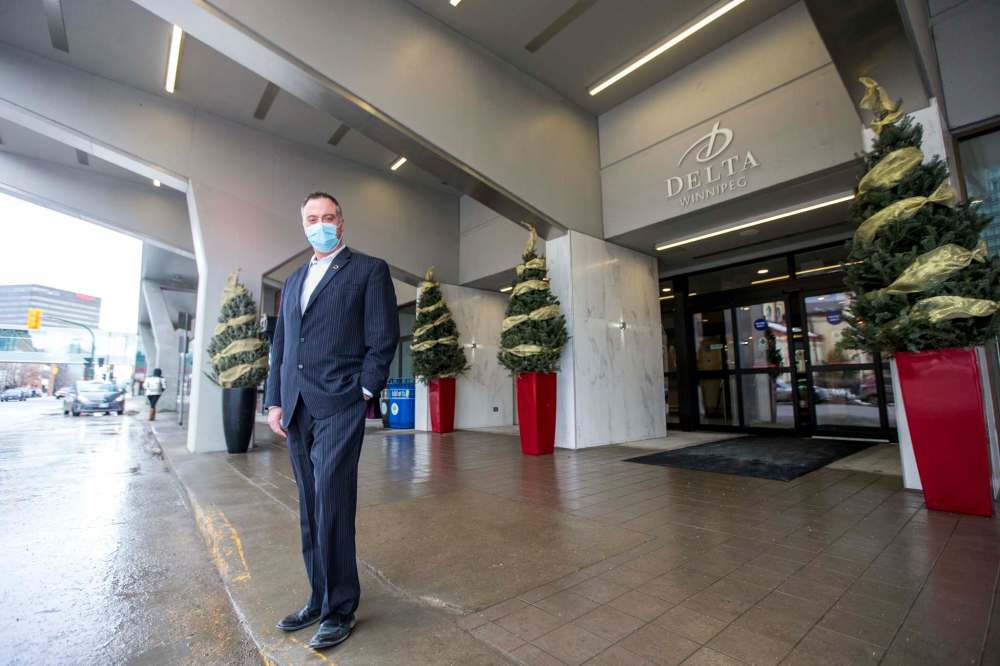
2020 was supposed to be more of the same. Then came the second week of March, and a convention of local teachers. “I can remember it very clearly,” says Kennedy, sounding somewhat like a man preparing to tell a war story.
Throughout the hotel community, and even within the conference, the words “virus” and “pandemic” were now peppering the conversation. Like every hotelier, Kennedy was keeping an anxious eye on the news. A case in Toronto. Oh my goodness, Italy. You know the rest: the conference ended, the NBA suspended its season, the NHL, too, and Dr. Brent Roussin, Manitoba’s top public health doctor, told you to stay home. Justin Trudeau offered daily updates from Rideau Cottage. Travelling — the lifeblood of the hotel world — was now inadvisable. Border closures were discussed.
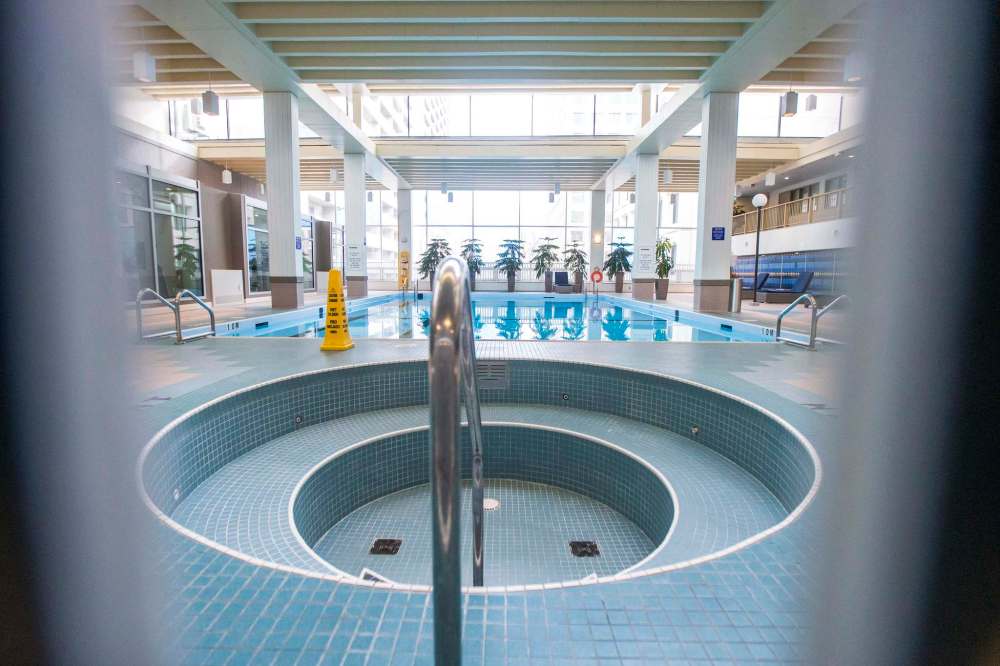
Conferences and guests began rescheduling to later in the year, if not cancelling outright. The hand sanitizer came out. The chairs were flipped up. The plexiglass was ordered. Staff were laid off, unclear when they’d be brought back. In April, the hotel closed. Different versions of the same story happened at every hotel in the city, province, country and world.
Accommodation revenues, which were soaring at Manitoba hotels in January and February, crashed, dropping by more than 60 per cent. Major draws for hotels, like Bell MTS Place and the RBC Convention Centre, cancelled or rescheduled concerts and events that normally brought thousands of guests each year. The provincial hotel revenue and cash-flow curves started the year arched upwards like a smirk. Over time, they started to look more and more like a frown.

“We are one of the hardest-hit industries, and our hit was one of the first,” says Scott Jocelyn, the president of the Manitoba Hotels Association. “Unfortunately, we’ll probably be one of the ones to recover last.”
And it’s difficult to say how many won’t at all.
“In the span of two weeks, we went from being a very full hotel to a very empty one,” says the Delta’s Kennedy.
For the last 12 months, despite every effort taken, its 393 rooms have mostly stayed that way. For a single night, I occupied one.
On the way to my room on the 16th floor, a kind cleaner says hello to me while pushing his cart out of a suite down the hall.
“Enjoy your stay,” he says.
● ● ●
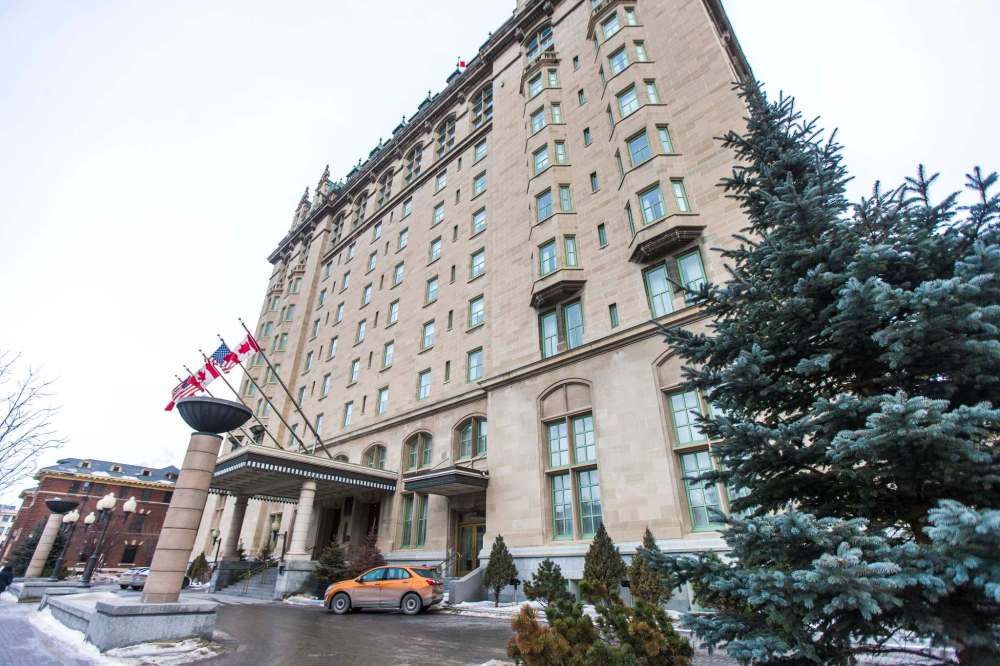
It was 1977 when Beth Pagarigan first heard the words “Fort Garry Hotel.”
She was 18, had just moved to Winnipeg from the Philippines, and she was looking for work. Her English, in her own words, was not so good. But a friend had found a job at the landmark downtown hotel, and suggested Pagarigan give it a try.
So she did, and she liked it. She sort of loved it. So much so that she never left. “I made so many friends,” she says. “Customers give you a hug.”

Throughout the past 43 years, guests were as sure to walk up the stone steps into the Fort Garry as they were to see Pagarigan’s smiling face at breakfast, where she worked diligently as an attendant, doling out mimosas and meals, and for years working the famed Sunday brunch.
As the hotel evolved — through changing ownership, through bankruptcy, through everything — Pagarigan never left, and the hotel remained a constant part of her life.
“I was there all along,” she says.
Then she wasn’t. March 2020 came. For the first time since 1977, Pagarigan wasn’t quite sure when she’d be back. Like thousands of hotel workers in the city, she felt uncertain and worried.
Fort Garry owner Ida Albo compares the suddenness and severity of the pandemic’s arrival to a guillotine. Since she and husband Rick Bel took over the hotel in 1993, they’ve managed to revamp the brand and expand the institution to become a behemoth of room stays, food and beverage service (which accounts for about half of all revenue) and spa business. When they took over, she says, the Hydro bill was higher than the room revenue.
Initially, Albo says there was some optimism that the pandemic’s strain would be a temporary one, impacting the hotel’s business deeply for the short term. “We thought at first this would be four to six weeks,” she says.
Wishful thinking. Survival mode was what came next, which meant working with a skeleton staff, cutting back on most amenities, doing repairs and preparing plans A through Z. Meanwhile, occupancy rates have hovered around 10 per cent. Generally, hotels hope to operate with at least 50 per cent occupancy, with 70 to 75 per cent a high standard, in order to maintain their business. With spa revenue and food and beverage revenue virtually non-existent, that occupancy rate was even more stark.

By September, the hotel was preparing to get back to business, and to bring back workers such as Pagarigan, who excitedly picked up the phone to hear she’d be returning. That tenure, sadly, lasted three weeks before code red began.
For three months, she waited patiently, as Albo and the Fort Garry management team planned for what was next as the hotel continued to operate with an intensely reduced workforce and consumer base. One concept being explored is converting some rooms to “wellness rooms” with workout equipment or yoga spaces. Another is the conversion of empty guest rooms into bookable private lounges for customers at the hotel’s spa.
The hotel is also adding an in-house gym, though it’s unclear when it will be allowed to open. And the massive ballrooms — once filled with wedding receptions, charity galas and national conference attendees — are now being used as spacious restaurant and dining spaces.
“I think we’ll be well-positioned on the other side of this,” she says.

While owners and managers try to stay afloat, workers like Pagarigan also face tremendous uncertainty. An MNP study of the Manitoba hotel industry’s pandemic impact found conference hotels reduced workforces by 80 per cent last year, and projections show employment levels will remain far below normal for the foreseeable future.
There’s concern that skilled employees won’t be available to return by the time the industry recovers, meaning lower productivity and higher costs are likely, the study says. When they do return, the work will likely include new wrinkles and skillsets as well, something Pagarigan found out soon enough.
By February, she was called back to work, this time on the dinner shift, a big change from breakfast, and a challenge, because the non-drinker would have to describe and recommend wine and rely on co-workers to guide her through it.
“There was so much to learn,” she says, adding how excited she was to be back in any capacity at all. “But I learn. And I realized I’ve still got it.”
Thankfully, Pagarigan got word that breakfast service would be starting up as soon as Saturday morning.
“I was jumping for joy,” she says. “I told all my dinner friends, you can come to breakfast, and it’s my turn to teach you.”
● ● ●
Across Main Street, general manager Joel Waterman takes stock of the Inn at the Forks, a cornerstone of local company Sparrow Hotels’ portfolio. He likens March 2020 to a rushing faucet being shut.
The Inn’s situation was similar to that of the Fort Garry. Its flagship restaurant, Smith, was closed for months. Its conferences and events schedule wiped clean. Its spa shut down. Its occupancy dipped, at its lowest point, to three per cent in April, rebounding during the summer to about 25 to 30 per cent before summer vacation ended.
For the Inn, the pandemic led to the layoff of about three-quarters of its 175-member workforce.
“What we’ve had for the last year is a leaner team doing more with much less,” Waterman says. Many of the services that once helped make the hotel an especially luxurious stay were slashed, and services such as revenue management systems and software were cancelled. The sales department was winnowed.
The local hotel industry, always competitive, has now grown even more so. Like every economic problem, it can be tied to supply and demand.
‘Every day, you plan and you hope that something will come along. But the building is there and your expenses and taxes are there regardless of whether anyone walks through the door.’– Joel Waterman, general manager at Inn at the Forks
There are thousands of empty rooms every night, but there is a severely depleted and, in many cases, unconfident consumer base looking to book them. Pre-pandemic, the city attracted nearly four million visitors a year. That figure likely won’t be reached again for at least two to three years, most estimate.
So for the time being, a bucketful of hotels in the city are competing for a relative handful of customers on the local market, with most corporate travel cancelled and a negligible external tourism market likely to prevail in the near future.
Meanwhile, average daily rates in the city have decreased 10 per cent, per CBRE commercial real estate services, while revenue per available room has dropped 71 per cent. One national estimate by firm STR from August forecasted the revenue per available room to rebound to $67 in 2021, equal to the figure from 2003, meaning hotels will attempt to recoup over a decade’s worth of growth after one catastrophic event.
“What we’re living and dying by is the staycation,” Waterman says.
At the moment, the hotel is living. A combination of “kickass marketing” and a Valentine’s Day boost had the Inn back to nearly 30 per cent in occupancy. It feels funny to celebrate running at less than half the capacity the hotel is used to, but that’s just the kind of year it’s been, Waterman says.
“What we’re living and dying by is the staycation.”–Joel Waterman
Bruce MacKay, manager of the Holiday Inn Airport West, says it’s important to look at any positives you can get right now. “You get to connect with the guests, because nobody has many of them,” he says. The patronage of customers old and new feels especially impactful.
However, the silver linings are admittedly tough to spot. “Every day, you plan and you hope that something will come along,” MacKay says. “But the building is there and your expenses and taxes are there regardless of whether anyone walks through the door.”
It’s that fact that led every single hotel manager or owner interviewed for this story to say that “sector-specific support” from the provincial governments is needed.
Jocelyn points out that despite decimated business, hotels are paying property taxes based on their pre-pandemic revenues, a formula that adds insult to injury to the industry at large.
The concerns extend beyond the perimeter, says Connor Ward, the part-owner of the 43-room Altona Hotel, which in the small town is normally the go-to place for any major functions and events. Ward, 32, and his business partner, put up their life savings to buy the hotel six years ago, and leveraged their success to purchase another in Winnipeg, the Howard Johnson Winnipeg West, in 2019.
Significant room expansions and beer-store renovations were supposed to happen in 2020, but those plans were shelved as any capital was used to pay operating costs.
“(In Altona) we have laid off 95 per cent of our workforce twice,” says Ward, explaining it was a decision not taken lightly. “We still are forced to pay our property taxes ($70,000), business taxes, and every other government tax and fee, (plus) the cost of PPE and every piece of infrastructure needed to keep our hotel open.”
All told, last year the hotel paid over $1.5 million in various taxes.
“We have laid off 95 per cent of our workforce twice.”–Connor Ward, part-owner of the Altona Hotel
The hotel’s beer vendor has been busy, Ward says, but the margins are low and the overhead to operate is high. The beer vendor’s success is also a catch-22, he says: the revenue it brought in made the hotel ineligible for many government subsidies, and greatly reduced the amount of subsidies available that it did qualify for, however, it also is the only consistent revenue it can make to pay off the taxes soon due.
The situation is dire, Ward says. “We have been left out with no support to try and survive. For that, it is extremely disappointing.”
“I don’t want to paint too ugly a picture,” says Waterman, summing up the hotel industry’s current state of affairs. “But the picture is ugly.”
To get back to pre-pandemic revenue levels might take three to five years for most hotels, assuming forecasts hold true, and assuming a lot of other dominoes fall in the right order.
“Maybe then we all get back to where we were,” Waterman says.
Maybe.
● ● ●
I am writing this story from Room 1637, closer to the rooftop pool than to the crawling traffic below on St. Mary Avenue.
The room is clean when I walk in. The bed is almost bigger than my bedroom at home. Unlike the one at my apartment, the tub actually drains after I shower. I feel removed from the world and dropped into a sensory deprivation tank. There are about 30 other people staying in the hotel. I wonder what they’re escaping from and if they’re feeling like I do.
Then I turn on the TV and see ads showing gloved hands wiping down elevator buttons and doorknobs, and a masked man spraying down a room like mine with an electrostatic cleaner. Once again, I’m confronted by how strange this would have felt two years ago, and how right now, this stock footage is exactly what I need to see as a consumer.
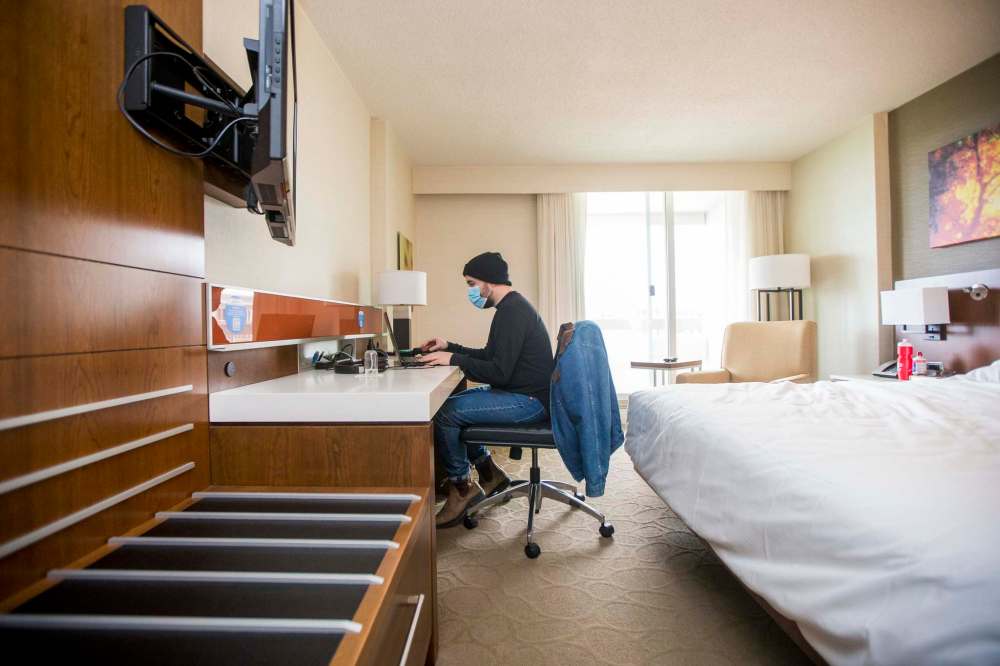
For a few hours, I try to relax and enjoy the escape, and feel safe. But the escape is illusory, a luxurious hiding place, and I feel guilty and conflicted about how comfortable I feel, while also feeling reassured that workers like Pagarigan are back on the job at hotels across the city, a sign of some positivity, and that hoteliers are staying afloat. Bitter reminders of the world outside soon amass.
By noon, 97 more people in Manitoba are reported with COVID-19. Two more people have died, bringing the total to 886 since last year, over two times the capacity of the Delta. On the streets below, hundreds of people struggle to survive the cold and find safe shelter. And here I am, sitting at a desk on the 16th floor of a hotel, typing.
I close my laptop after finishing an early draft and pack up. The cleaner from the night before is at the elevator, having just wiped down its buttons. “Take care of yourself,” he says.
The lobby is still empty, cavernous and a bit sad, and the streets are rattling with a chorus of jackhammers. Across the street, construction crews are working on another hotel, it turns out. I wonder what its lobby will look like when it’s complete, and what words will describe it best.
ben.waldman@freepress.mb.ca

Ben Waldman covers a little bit of everything for the Free Press.
Our newsroom depends on a growing audience of readers to power our journalism. If you are not a paid reader, please consider becoming a subscriber.
Our newsroom depends on its audience of readers to power our journalism. Thank you for your support.




